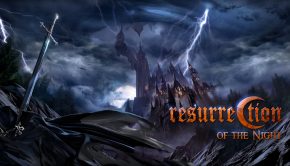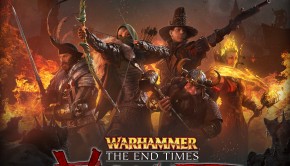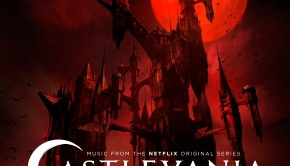Gears of War -Judgment- The Soundtrack
 |
Album Title: Gears of War -Judgment- The Soundtrack |
| Record Label: Sumthing Else Music Works |
|
| Catalog No.: SE-3053-2 |
|
| Release Date: March 19, 2013 |
|
| Purchase: Buy at Amazon | Download at iTunes |
Overview
Gears of War 3 had brought the story of the conflict between humanity and the Locust invaders to an end, but not surprisingly the game sold like hot cakes and Epic Games had about six million reasons to continue the franchise. Of course, the easiest way to do this would be through a prequel to the Gears of War saga. Fast forward less than 18 months from Gears of War 3‘s release and we get Gears Of War: Judgment, which fills gamers in on the back story of series protagonists Damon Baird and Augustus Cole before the events of Gears of War. Despite some minor changes to the franchise formula, the sense that Gears of War: Judgment was essentially more of the (accomplished) same seemed to prevail among game journalists, which resulted in a somewhat muted, if still solid critical reception.
There were also few surprises when it came to who would work on Judgment‘s music. Steve Jablonsky (of Transformers, The Sims and Battleship fame) would return after his work on Gears of War 2 and 3. With these two soundtracks, he had steered the franchise away from the dark industrial sound of Kevin Riepl’s Gears of War to a standardised heroic/militaristic sound typical of many Remote Control productions. For Judgment, Jablonsky was joined by Jacob Shea, another Remote Control cohort who had provided additional music for the Transformers and Pirates of the Caribbean films, among others. Jablonsky and Shea’s latest collaboration had been the financial and artistic dud that was Battleship, but Shea had already contributed to Gears of War 3. Game score fans were able to savour the results of this collaboration from March 2013, when Judgment‘s soundtrack was released on both CD and across online music retailers.
Body
Well, let’s cut to the chase: Gears of War: Judgment is a disaster, an unmitigated bore from start to finish. Sure, neither of Jablonsky’s previous Gears of War scores were masterpieces, but even proponents of his easily digestible Remote Control-style of writing won’t find much to latch onto on Judgment. Possibly as a way to reference Riepl’s sombre and gloomy score for the first Gears of War game and to underline Judgment‘s character as a prequel, Jablonsky and Shea dispense with the guilty pleasure brass melodies, empowering (synth) string ostinati and flagwaving patriotism that characterised previous Gears of War soundtracks. Judgment is all about grittiness, and not much else. Unfortunately, in their attempt to reprise Riepl’s bleak sound world, Jablonsky and Shea have thrown the baby out with the bath water, retaining only the harsher elements of the formula behind Gears of War 2 and 3 while discarding pretty much everything else. Lacking Riepl’s compositional prowess and creativity, all that Jablonsky and Shea leave Judgment with are thumping synthorchestral rhythms, sludgy, buzzing guitar riffs that desperately try to be tough and ‘metal’, and synth pads with an industrial and desolate edge. In other words, the two composers toss out mostly everything that made Gears of War 2 and 3 funand only leave behind the stripped-down skeleton of a score – austere sonic wallpaper composed on autopilot.
If there’s one impression that Judgment leaves, it’s one of monotony, although the opening track “Judgment” still seems to hold some promise. The cue is happy to simply present its ingredients – thundering percussion and slow-burning, overdriven guitar riffs – without actually working these into anything beyond a display of how loud and booming it all is. But at least there are some shreds of colour (calling it originality would be a bit much), some twangy guitar figures that add a bit of Spaghetti western cool that briefly recall Hans Zimmer’s Broken Arrow. However, from here on Jablonsky and Shea demonstrate their impressive single-mindedness – or potentially just lazyness – by steadfastly sticking not just to the same formula, but to the same elements for every single action cue on Judgment. The only question is whether the pounding rhythms or the metal-inspired, but terribly weak and clichéd guitars take precedence. There are no melodies to shape the tracks, no development within the cues apart from the hackneyed ‘getting louder over a simple ostinato figure’ approach, not a single interesting rhythmic idea on the whole album – this is truly a score that could have been written by a music software program. Sure, it all sounds undeniably powerful, but in an obnoxious, overbearing way and ultimately, it’s all hollow fury that signifies nothing. Worse still, it’s not even exciting. “High Surge”, with its techno-inspired rage and abrasive synth figures that compete with the guitars, comes closes to actually get some adrenaline going, but the other action tracks are happy to just chug along.
The true extent of the misery that are Judgment‘s battle cues becomes obvious when looking at how these noisy but wafer thin pieces manage to distinguish themselves – in the most minuscule of ways. “Undefined Charges” and “The Last Stretch” include portentous brass bits – some brief motifs on “Undefined Charges”, a number of sustained chords on “The Last Stretch” – that wouldn’t cause anybody to raise an eyebrow if these sounds appeared on most other scores. On Judgment, these feature almost make these tracks album standouts. “Hold the Line” manages to incorporate – wonder of wonders – a descending melody fragment. “Evac Zone” and “Fair and Swift” are still woefully repetitive, but showcase cleaner R/C-style rhythms that are at least a slight change of pace. By the way, “Evac Zone” is a great example of how the composers seem to have no clue about how to develop their compositions. The piece couples its empowering deep string and guitar rhythms with hints of melodies that for once could culminate in a satisfying power anthem – but all the build up is for naught and the music simply subsides. A number of action tracks still rely on unimaginative ‘da-da-da-da-da’ ostinati for some direction and urgency, but if these obnoxious rhythmic devices are one of the very few things that make your music more interesting and give it some purpose outside of simply grinding away, you know you’re in trouble.
In all fairness, Judgment doesn’t solely consist of annoyingly aggressive and ineffective action music – there’s also lot of of annoyingly anonymous and ineffective underscore to be had. These dreary and vaguely eerie background mumblings are interspersed into several of the action tracks, but start to actually take over the album around the halfway mark with “Gauntlet”. The track begins with three minutes of minimalist, barren underscore that might be a good fit for a world that the Locusts will soon invade and tear apart. However, outside of the context of the game, the music fails to elicit any interest, as its textures and mood are utterly stereotypical. “Gauntlet” is also noteworthy for its inclusion of Jablonsky’s Gears of War theme from the previous two franchise entries. Again though, all potential that this thematic reprise holds is squashed. It’s nice to hear the familiar melody in this wasteland of a score, but the theme simply pops up twice without reason or rhyme and then disappears for the rest of the album, making the melody’s inclusion feel token at best.
“Gauntlet” is followed by more brooding, atmospheric filler tracks that are rarely longer than two minutes and have next to nothing to say. You’d think that on a cue called “Enemy Unveiled”, there would be some drama because things get unveiled, but no – any musical flourish that appears in the track’s first minute quickly dissipates again. At least “Tower of Lightmass” deserves mention, as it holds the whole album’s best musical idea – a floating, humming female solo voice that is heard for some seconds. Yes, that’s the album’s peak of originality and colour. Judgment is indeed bland enough that it does make you yearn for the overwrought sentimentality of Gears of War 3‘s vocal contributions. For the record, “Vantage Point” dutifully references the ululating motif that has run through all Gears of War scores to date, but like on Gears of War 3 this ominous signature sound isn’t worked into any meaningful shape.
By the time the album reaches the home stretch, Judgment has lost all momentum thanks to the dunderheaded sequencing that puts most of the ambient underscore into the album’s second half. “Taking A Stand” finally returns the score’s action elements to bring the album to some sort of climax, but following track “Pendulum Swings” kills that hope right away and turns into another industrial mood-setter. Sadly enough, Jablonsky and Shea seem to think that simply quoting Riepl’s Gears of War main theme on “Taking A Stand” and “Pendulum Swings” is enough to bring the album to a satisfying close – why make an effort if you can let other people’s work do the job? The album closer “Charges Dropped” then tries to be a stirring conclusion with its snare drum rhythms and swelling horn chords – something not previously heard on Judgment – but again it all goes nowhere and the whole depressing affair appropriately ends with a whimper.
Summary
There’s not much left to say really: Judgment is an impressive display of creative bankruptcy, a score so bland that it doesn’t even qualify for so-bad-it’s-good status. Judgment might hold sufficient material for five minutes of decent music, but the soundtrack stretches its assets across almost an hour, and the result is one of the most repetitive, monotonous Western mainstream scores in recent memory. Jablonsky and Shea’s plan to leave behind the bombast of previous Gears of War scores and return to the gloom of Riepl’s Gears of War fails spectacularly.It’s all an oppressive mix of browns and greys, the action tracks a neverending succession of pounding and grinding electronic and orchestral rhythms paired with uninspired, but oh so gritty guitar work. Then again, compared to the absolutely ineffective, meandering underscore that dominates too much of the album, the battle cues might be the better, if more obnoxious choice. It’s difficult to find any aspect of Judgment that is worth recommending – yes, it’s punchy at times, but so is the sound of a jack hammer, and that device is usually handled with more skill and care than what’s on display on Judgment. It’s also competently produced, but in the case of a multi-million dollar project like Judgment, that’s not really an accomplishment and should simply be expected as a given. Just avoid this.
Do you agree with the review and score? Let us know in the comments below!
1
Posted on March 22, 2014 by Simon Elchlepp. Last modified on March 22, 2014.














